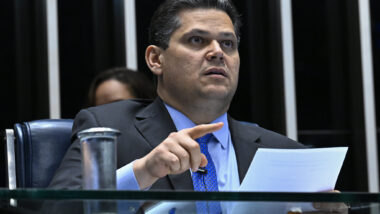O Conselho de Segurança da ONU aprovou nesta quarta-feira (9) nova rodada de sanções contra o programa nuclear do Irã. A resolução foi aprovada por 12 votos a 2, com 1 abstenção.
O Brasil, que ao lado da Turquia apoiou um acordo para tentar deter as sanções, votou contra.
O Itamaraty divulgou a íntegra da intervenção da embaixadora do Brasil na ONU, Maria Luiza Ribeiro Viotti, explicando o voto.
Leia abaixo o original em inglês:"Mr. President,
Brazil has voted against the draft resolution.
In doing so, we are honouring the purposes that inspired us in the efforts that resulted in the Tehran Declaration of 17 May.
We do not see sanctions as an effective instrument in this case. Sanctions will most probably lead to the suffering of the people of Iran and will play in the hands of those, on all sides, that do not want dialogue to prevail.
Past experiences in the UN, notably the case of Iraq, show that the spiral of sanctions, threats and isolation can result in tragic consequences.
We voted against also because the adoption of sanctions, at this juncture, runs contrary to the successful efforts of Brazil and Turkey to engage Iran in a negotiated solution for its nuclear programme.
As Brazil repeatedly stated, the Tehran Declaration adopted 17 May is a unique opportunity that should not be missed. It was approved by the highest levels of the Iranian leadership and endorsed by its Parliament.
The Tehran Declaration promoted a solution that would ensure the full exercise of Irans right to the peaceful use of nuclear energy, while providing full verifiable assurances that Irans nuclear program has exclusively peaceful purposes.
We are firmly convinced that the only possible way to achieve this collective goal is to secure Irans cooperation through effective and action-oriented dialogue and negotiations.
The Tehran Declaration showed that dialogue and persuasion can do more than punitive actions.Its purpose and result were to build the confidence needed to address a whole set of aspects of Irans nuclear programme.
As we explained yesterday, the Joint Declaration removed political obstacles to the materialization of a proposal by the IAEA in October 2009. Many governments and highly respected institutions and individuals have come to acknowledge its value as an important step to a broader discussion on the Iranian nuclear program.
The Brazilian government deeply regrets, therefore, that the Joint Declaration has neither received the political recognition it deserves, nor been given the time it needs to bear fruit.
Brazil considers it unnatural to rush to sanctions before the parties concerned can sit and talk about the implementation of the Declaration. The Vienna Groups replies to the Iranian letter of 24 May, which confirmed Irans commitment to the contents of the Declaration, were received just hours ago. No time has been given for Iran to react to the opinions of the Vienna Group, including to the proposal of a technical meeting to address details.
The adoption of sanctions in such circumstances sends the wrong signal to what could be the beginning of a constructive engagement in Vienna.
It was also a matter of grave concern the way in which the permanent members, together with a country that is not a member of the Security Council, negotiated among themselves for months at closed doors.
Mr. President,
Brazil attaches the utmost importance to disarmament and non-proliferation and our record in this domain is impeccable.
We have also affirmed - and reaffirm now - the imperative for all nuclear activity to be conducted under the applicable safeguards of the International Atomic Energy Agency. Irans nuclear activities are no exception.
We continue to believe the Tehran Declaration is sound policy and should be pursued. We hope all parties involved will see the long-term wisdom of doing so.
In our view, the adoption of new sanctions by the Security Council will delay, rather than accelerate or ensure progress in addressing the question.
We should not miss the opportunity of starting a process that can lead to a peaceful, negotiated solution to this question.
The concerns regarding Irans nuclear programme raised today will not be resolved until dialogue begins.
By adopting sanctions, this Council is actually opting for one of the two tracks that were supposed to run in parallel in our opinion, the wrong one.Thank you".



